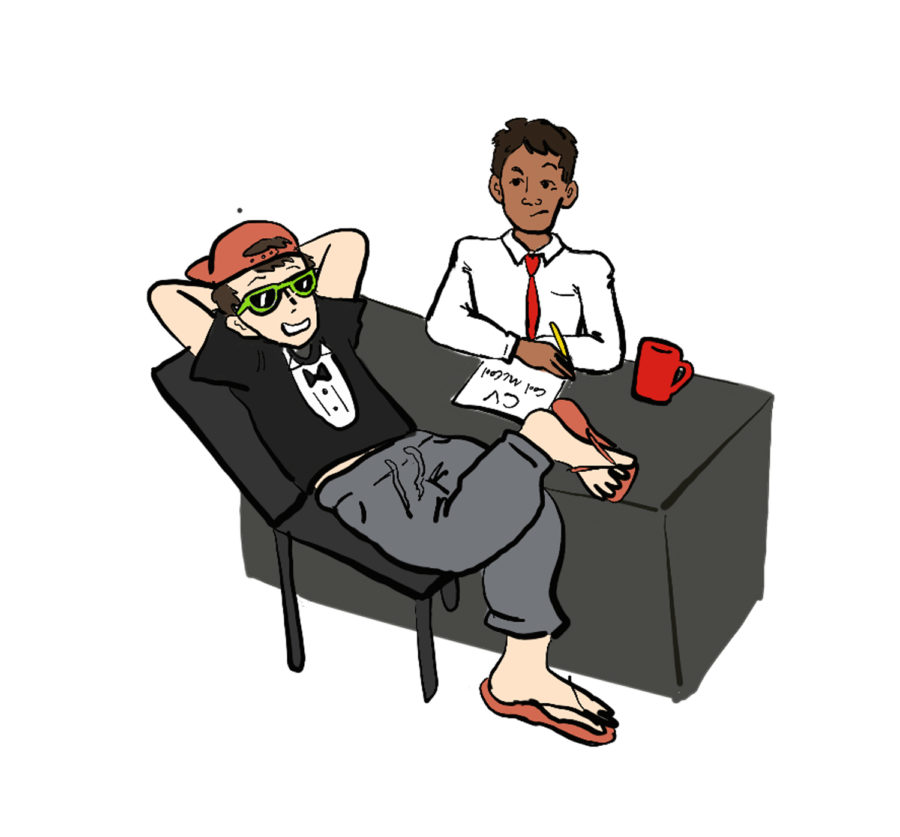Get hired: a guide to your next job interview
September 12, 2018
In the waiting room of Sennott Square two summers ago, I sat rigidly in an uncomfortable plastic chair, my sweaty palms squeezing the armrests while I waited to be called in for an interview that could land me a writing internship in Germany — an internship that could make or break my plans for the future.
I did everything in my power to prepare. I went to Pitt’s Career Center on the second floor of the William Pitt Union to review my resumé and I practiced introducing myself in front of what felt like a million different mirrors. But as I shakily got up and walked toward the interviewing room, I feared I hadn’t prepared enough.
Interviews aren’t difficult solely because of the questions — they’re nerve-racking because you only get one chance to make a first impression on a potential employer. While qualifications are vital in securing a job, your appearance, mannerisms and tone can be equally important.
According to the American Psychological Association, people form judgements immediately upon meeting one another, meaning first impressions can have lasting consequences when it comes to potential employment opportunities. So when you’re interviewing for a job, every little thing matters — especially your attire.
While it may seem superficial, the first thing an employer notices about your appearance is what you’re wearing. By dressing appropriately for your interview, you’ll exude an air of professionalism and feel more confident. Many companies require business professional attire, but some may only ask for jeans and a nice sweater. If you’re in doubt, though, wear business professional — it’s better to be overdressed than underdressed.
Business professional attire should be conservative and modest — plain and dark colors are the best way to accomplish this look. Your attire can reveal key parts of your personality to employers, like work ethic and ambitions — so don’t forget to iron your business suit, or else you might give your interviewer the wrong impression.
Even if you don’t own professional clothes, you might be in luck. According to the Los Angeles Times, dress codes are becoming more casual as more millennials enter the workforce. Just make sure you ask the company what attire is appropriate or consult the internet if possible. Preconceptions based on looks can make or break your chance of getting the job before you even open your mouth.
When you begin your interview, it is crucial that your body language matches your words. Forbes lists bad posture, lack of eye contact, aggressive hand motions, crossed arms and fidgeting as some common mistakes you want to avoid during an interview.
Instead, sit up straight, hold eye contact, keep your hands low, relax your body and focus your nervous energy into connecting with the interviewer. By staying calm, you subtly communicate that you are confident and able to handle the stressors the job may entail..
The questions themselves will likely be the most anxiety-inducing part of the interview — but there’s a simple way to tackle them. Prepare in advance by researching common questions and outlining your answers. As you write out your responses, you’ll gain confidence — but you might still be asked a question you don’t know how to answer.
According to The Muse, a career resources website, when this happens you should take a deep breath, pause to think and try to integrate concepts you’re more familiar with. Applying the question to a similar experience is better than nothing. But if your mind draws a blank, just admit you don’t know the answer — lying will only prove your ignorance and come to bite you in the butt later. Answer politely and express your desire to use the position as a learning opportunity.
You can’t prepare for every curveball in an interview — but to become smoother in handling them, you’ll need to practice. And to replicate the true interviewing experience, you should practice with a complete stranger. Someone at the Career Center will always be available to perform a mock interview during its weekday hours from 8:30 a.m. to 5 p.m. Folks there won’t put you at ease like a friend would, but that’s the idea. They’ll be able to critique your interview honestly and offer helpful advice.
Once the interview is over, be sure to thank the interviewer for their time and the job opportunity. According to experts at the Career Center, you should also send a thoughtful thank-you letter — it’ll affirm your interest in the job and solidify a positive first impression.
With these tips, you’re all set for your next interview. Just remember to look sharp, sit up straight and answer questions with conviction. Hopefully, you’ll soon be worrying about your first day on the job instead.








